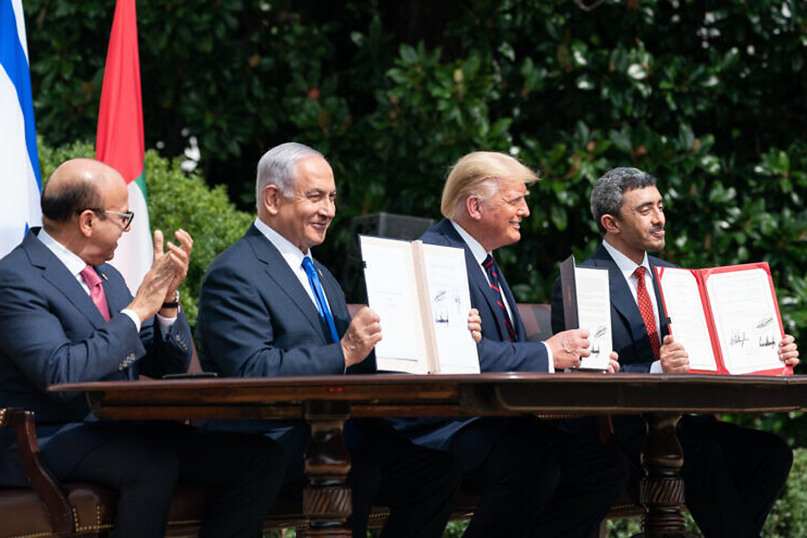
By Israel Kasnett
(JNS) One year since the establishment of the Abraham Accords—agreed to by Israel and the United Arab Emirates on Aug. 13, 2020 and then officially signed on the White House lawn on Sept. 15—the Middle East is business as usual, but now greatly improved. The accords established normalized ties between Israel and the UAE, followed soon after by Muslim-majority countries of Bahrain, Sudan and Morocco.
There was no catastrophic backlash from extremists, as predicted by so-called experts, and the Palestinian issue is still somewhat on the regional backburner. And in the time since, trade between Israel and the UAE alone has reached nearly $600 million; it’s expected to reach $1 billion by the end of the year. For many observers, the accords are an example of leaders in the Middle East establishing a new reality based on peace and prosperity.
Asher Fredman, CEO of Gulf-Israel Green Ventures (GIGV), has invested his energies in bridging the greentech leadership in Israel with the robust development in Gulf countries to further sustainable development in the region. As the UAE and Bahrain are transitioning from traditional sources of greentech and cleantech, Fredman and GIGV are working to pair interested users with innovative technologies and expertise.
Fredman told JNS his goal is “to connect between the green tech and cleantech ecosystems because these are areas in which both countries are focused.”
He said the Emirati leadership adopted a vision “to transform the country into a leader in sustainability and innovation, and obviously, there are lots of exciting Israeli companies in that space.”
He noted that “there are some differences” that exist between the two countries. For example, the Emiratis are more used to dealing with large multinational corporations and not small Israeli startups.
“We are very active with our Emirati partners to overcome those barriers so that we can realize the full potential of this cooperation,” he said, adding that the Emiratis “are great people; it’s fun to work with them.”
Fredman also pointed out that Emirati business people “are smart,” but they “also prioritize trust and personal relationships.”
Alongside his work with GIGV, Fredman also established the Israel-Emirates Forum, a grassroots organization for people from different backgrounds to encourage dialogue, understanding and cooperation.
Just this past week, a number of developments highlighted the success the Abraham Accords have brought to the Middle East and North Africa.
Israeli Foreign Minister Yair Lapid met on Wednesday with Moroccan Foreign Minister Nasser Bourita in Rabat, where he inaugurated Israel’s mission the following day. Lapid’s was the first visit by an Israeli foreign minister since 2003.
Earlier this week, the Jerusalem Center for Public Affairs signed a historic agreement for cooperation between the Bahrain Center for Strategic, International and Energy Studies (Derasat) headed by Bahrain’s Deputy Foreign Minister, Dr. Sheikh Abdullah bin Ahmad al-Khalifa, and the Jerusalem Center President, former director of the Ministry of Foreign Affairs, Ambassador Dore Gold.
Before the signing, Gold said his think-tank decided to “create a network of research institutes in the Persian Gulf region and in other countries.”
“Our goal is to create an array of cooperation agreements with the countries of the Abraham Accords and to convey a message to the United States, Europe and other countries of a realistic understanding of the challenges that we share—the danger of Iran’s policies in the region and in the world,” he said.
On Thursday, the Abba Eban Institute for International Diplomacy at the IDC Herzliya also signed a memorandum of understanding for cooperation with the Derasat Institute.
‘We created something new here’
Jerusalem Deputy Mayor Fleur Hassan-Nahum said she was involved in some under-the-radar joint projects with the UAE and decided to set up the UAE-Israel Business Council (of which Fredman is also among the founding members), which according to its website, aims “to build mutually beneficial relationships between Emiratis and Israelis that advance business ties, investment, and understanding.”
She told JNS she was “caught completely by surprise” when the accords were announced, but within a few short days created an online platform.
Hassan-Nahum said she didn’t even realize the true value of webinars she conducted between Israelis and Emiratis until an Arab from eastern Jerusalem told her he was in a webinar and met Emirati and Israeli partners with whom he plans to build a business.
“People were thirsty for it,” Hassan-Nahum said of the connection between Israelis and Emiratis. “People needed it; it filled a very important need.”
If the past year was any indication, Israel could be looking at a very lucrative future together with its newfound business trading partners.
The coronavirus got in the way of incoming tourism and a defense trade show usually held in the Gulf. If Israel can succeed in overcoming the challenges posed by the global pandemic, the country could see billions more in trade and revenue.
Hassan-Nahum is also responsible for tourism in Jerusalem, and she said she has started to create the infrastructure for “a new type of tourist” Israel has rarely seen, meaning visitors from Gulf countries.
“If we managed to create so many relationships during a global pandemic,” she said of the last year, “I think it bodes well for a future of mutual prosperity.”
“We created something new here,” she said. “We are creating the model for a new type of peace.”
Main Photo: From left: UAE Foreign Minister Abdullah bin Zayed Al Nahyani, Israeli Prime Minister Benjamin Netanyahu, U.S. President Donald Trump and Bahraini Foreign Minister Abdullatif bin Rashid Al-Zayani at the signing of the Abraham Accords on the South Lawn of the White House, Sept. 15, 2020, Credit: White House/Joyce N. Boghosian.








 Southern New England Jewish Ledger
Southern New England Jewish Ledger














